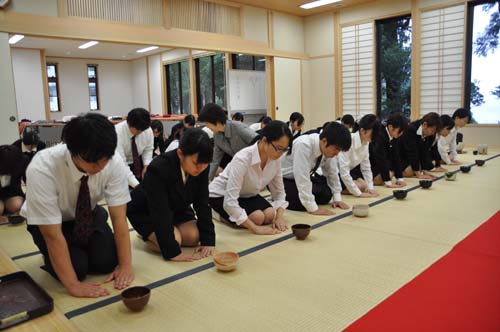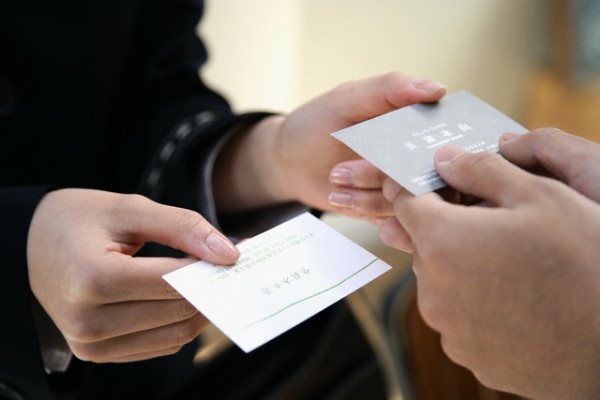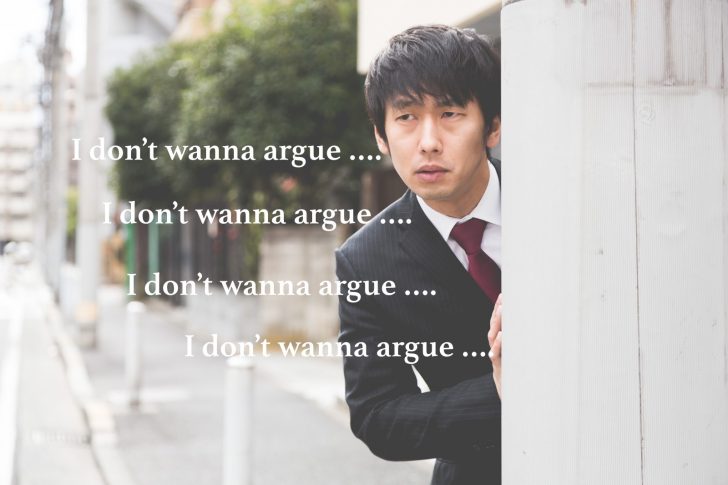
How to deal with Japanese workers

The other day, when I was doing my work at a cafe, I heard two men sitting just next to me talk about how to communicate with their co-workers.
A man who was asking for advice seemed to be a Chinese business person (a fluent Japanese speaker) who just started working in Japan and the other was his Japanese friend.
Chinese:
I don’t know how to convey my feelings to other Japanese co-workers especially when our opinions conflict.
Japanese:
How long have you worked for the company?
Chinese:
For about three months.
Japanese:
Oh, just three months.
You don’t need to have an opinion for the first three years.
Because you won’t be given autonomy.
So, just follow what your older co-workers mentioned.
Then, you can avoid conflict.
This is our culture.
Chinese:
Th..
Do I have to be a slave?

I couldn’t help bursting out laughing while the Chinese man seemed to be overwhelmed by the “great” advice.
The advice is definitely obsolete and it must’ve been very shocking to him. On the other hand, I thought that still this outdated mind-set might take root in this society since people used to say something like that in the past.
Perhaps, this mentality could work out when the economy was growing, as the advice can be paraphrased as “it would be better for you not to think too much and experience as many situations as possible. Then, you’ll grow as a professional businessman unconsciously.”
【Beautiful Japan】Japanese Lamp(LED)縦格子行燈
However, as the global competitions have become severe in any field, we’re required to think about a lot of things in order to survive.
Hence, we have to be more logical and take actions more carefully. Needless to say, the advice that the Japanese man gave to the Chinese businessman was wrong.

In addition, I’m pretty sure that this obsolete culture where we always have to follow what older employees say has caused a number of chaotic consequences including “karoshi“.
Japanese workers try to avoid conflict

My American friend who lived in Japan for 4 years until last year also told me that he couldn’t think of two cultures that were more different than Japan and the United States in their business styles.
True. According to the map above “Preparing to Face Your Counterpart“, Japan and the U.S. are put into the opposite segments.
While American people are categorized into the “Emotionally Expressive & Conrontational” type, we Japanese are regarded as “Emotionally Unexpressive & Nonconfrontational (Avoids Confrontation)”.
Even for us, “Japanese” people are difficult to understand, as they express their neither emotions nor opinions clearly specifically in front of others.
This is because the Japanese society prioritized teamwork, and opposing others’ opinions was regarded as some sort of evil in the past.

Accordingly, many people are afraid if their opinions might trouble others.
Therefore, they choose to keep quiet or to agree with others all the time (even if they don’t agree).
A knack for getting along with Japanese
On the other hand, I’ve also recognized that Japanese people really like to see foreign people following Japanese manners because we also appreciate that non-Japanese people have respect for our culture.

In other words, not everyone behaves nicely in Japan. For example, I’ve seen many foreigners getting drunk, getting carried away and doing whatsoever they wanted especially in big cities like Tokyo and Osaka.

The typical example is Logan Paul, an American Youtuber. This one disrespected the country, the culture, people and all kinds of stuff that Japan has consisted of.
So, if you want to get along with Japanese workers, first you need to know how they behave in their daily lives (or in their businesses).
Today, I’ll tell you three important things that you have to know.
1. Know the proper greeting

Hold your business card in a proper way, which means with two hands, usually with the readable side facing the person you’re giving the card to.
2. Understand Japanese try to avoid conflict

As I mentioned earlier, you need to understand avoiding conflict is part of the Japanese culture.
For instance, if you ask your Japanese co-worker, “Did you like the terms of the agreement?”, he’s going to say, “ Yes, the terms of the agreement are very interesting. Perhaps a few things need some further study. “
Well, that’s his way of saying that he really doesn’t like the agreement at all.
3. Be social

You want to get out there. You want to go to dinner. You want to go to karaoke. And at these times, this is where you’ll hear the real feelings come out.
During the day, it’s so difficult to hear what they’re really thinking and feeling particularly if it’s problematic only because (I’m sorry to say this again and again) Japanese always try to avoid conflict.
If you understand these three significant things here, you’re already ready to work for a Japanese company! Good luck!
Sponsored Link




























